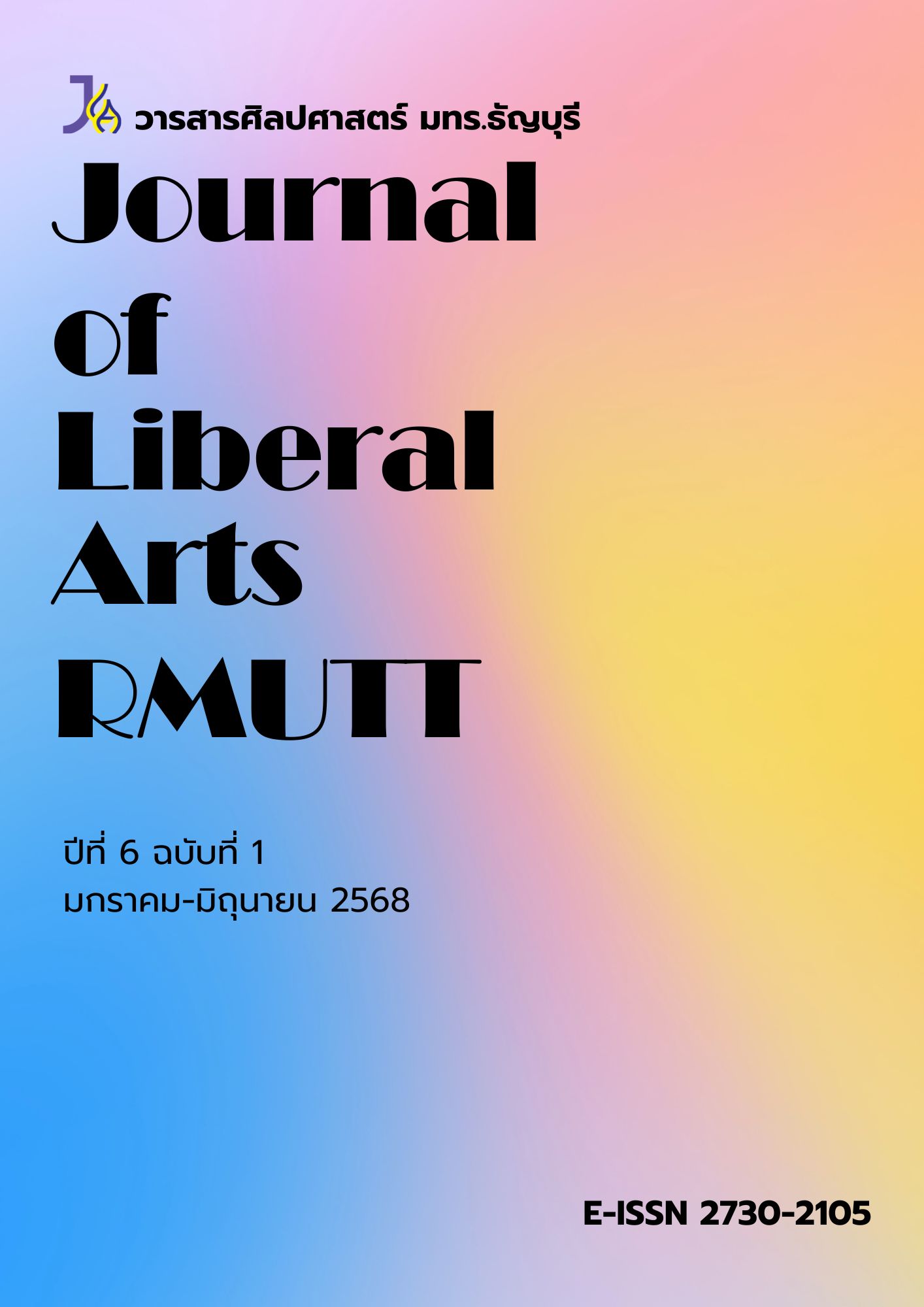Pedagogical Guidelines Using Integrated Teaching Approaches to Enhance Undergraduate Learners’ English Oral Communication Ability
DOI:
https://doi.org/10.60101/jla.2025.6.1.6565Keywords:
integrated teaching approaches, English oral communication ability, English language teachingAbstract
International communication in the present time necessarily involves the English language as the medium of communication. Especially, the competency in English for oral communication becomes an essential skill, that the English users are needed to be well equipped. Effective English oral communication helps the speakers achieve the communicative goals. Hence, the approaches employed in English learning management system in educational institutes to enhance learners’ oral English communicative ability are indispensable. However, most of English instructors have limited knowledge in applying and integrating varied teaching approaches in English oral communication classroom, regarding the relevant contexts of both instructors and learners. Most English instructors depend on traditional way of teaching English communication, leading to the limited efficiency in Thailand’s English learning management system in higher education. This academic article suggests the pedagogical guidelines using integrated approaches to enhance undergraduate learners’ English oral communication ability. The pedagogical guidelines focus on combining teaching approaches, integrating listening and speaking skills and integrating English teaching approaches with digital technology, instead of excessively relying on text-based method. The pedagogical guidelines proposed in this article is recommended to be applied in educational institutes to enhance English oral communication of learners, who enroll in the course of English for Oral Communication.
References
สิริดนย์ แจ้งโห้, สิริมา ป้วนป้อม, อมลณัฐ หุ่นธานี และสำราญ มีแจ้ง. (2564). การศึกษาปัจจัยที่มีผลต่อปัญหาในการอ่านภาษาอังกฤษของนิสิตสาขาวิชาภาษาอังกฤษ คณะศึกษาศาสตร์มหาวิทยาลัยนเรศวร. วารสารอักษราพิบูล, 2(2), 42-56.
Abdelaty, S. (2023). Overcoming obstacles to TBLT and CLT implementation: A study of Libyan English language teachers’ perspectives and strategies. International Journal of Scientific and Research Publications, 13(4), 2250-3153. https://doi.org/10.29322/IJSRP.13.04.2023.p13632
Akhter, T. (2007). Giving feedback and correcting errors in ESL classroom [Bachelor’s thesis, BRAC University]. Tuwhera. https://core.ac.uk/download/pdf/61799999.pdf
Alaye, A. & Tegegne, W. (2021). The roles of the teachers and students in the integrative language teaching approach and factors that affect the use of the approach in actual classroom. Journal of Literature, Languages and Linguistics, 80, 2422-8435. https://doi.org/10.7176/JLLL/80-01
Begović, A. (2020). Integrated language teaching. Patchwork: New Frontiers, (5), 4-15.
Bhagat, A., Vyas, R. & Singh, T. (2015). Students’ awareness of learning styles and their perceptions to a mixed method approach for learning. International Journal of Applied and Basic Medical Research, 5(Suppl 1), S58-S65. https://doi.org/10.4103/2229-516X.162281
Chhabra, P. (2012). Use of e-learning tools in teaching English. International Journal of Computing & Business Research, 3, 2229-6166.
Daqiq, B., Akramy, S. A. & Barati, A. M. (2024). The impacts of English language proficiency on employment opportunities. American Journal of Science Education Research, 1-8. https://doi.org/ 10.47991/2835-6764/AJSER-183
Deryabina, S. A., Aleksandrova, O. I. & Dyakova, T.A. (2019, May). Application of the integrative approach in foreign language teaching under modern educational environment. Atlantis Press. https://www.atlantis-press.com/proceedings/icpcs-19/125907007
Dörnyei, Z. (2009). The 2010s communicative language teaching in the 21st century: The principled communicative approach. Perspectives, 36(2), 33-43.
Færch, C. & Kasper, G. (1983). Strategies in interlanguage communication. Longman Group.
Gün, B. (2011). Quality self-reflection through reflection training. ELT journal, 65(2), 126-135. https://doi.org/10.1093/elt/ccq040
Jarrett-Thelwell, F. D., Burke, J. R., Poirier, J. N. & Petrocco-Napuli, K. (2019). A comparison of student performance and satisfaction between a traditional and integrative approach to teaching an introductory radiology course on the extremities. Journal of Chiropractic Education, 33(1), 21-29. https://doi.org/10.7899/JCE-17-26
Khan, M. & Soomro, N. H. (2022). Integrative approach to teaching English: Teachers’ perspectives and practices. Pakistan Journal of Educational Research, 5(2), 270-286. https://doi.org/10.52337/pjer.v5i2.532
Khomenko, O., Vasylchuk, L., Sotnykov, A. & Slaba, O. (2023). Pedagogical concept of integrative teaching and learning in the context of interdepartmental interaction. Arab World English Journals, 14(3), 276-291. https://dx.doi.org/10.24093/awej/vol14no3.17
Kirkpatrick, A. (2010). English as a lingua franca in ASEAN: A multilingual model. Hong Kong University Press.
Kornsak Tantiwich & Kemtong Sinwongsuwat. (2021). Thai university students’ problems of language use in English conversation. LEARN Journal: Language Education and Acquisition Research Network, 14(2), 598-626.
Mart, Ç. T. (2019). A comparison of form-focused, content-based and mixed approaches to literature based instruction to develop learners’ speaking skills. Cogent Education, 6(1), 1-27. https://doi.org/10.1080/2331186X.2019.1660526
Mohamed, K., Zaid, N. M., Ibrahim, N., Abdullah, A., Surif, J. & Hussin, A. (2021). The use of video project assignment (VPA) to enhance students’ achievement in communicative English subject. International Journal of Emerging Technologies in Learning (iJET), 16(23), 29-42. https://doi.org/10.3991/ijet.v16i23.27447
Mohlabi-Tlaka, N., De Jager, L. J. & Engelbrecht, A. (2017). Policy, practice, purpose: The text-based approach in contemporary South African EFAL classrooms. Per Linguam: A Journal of Language Learning = Per Linguam: Tydskrif vir Taalaanleer, 33(2), 22-35. https://doi.org/10.5785/33-2-713
Nakatani, Y. (2005). The effects of awareness-raising training on oral communication strategy use. The Modern Language Journal, 89(1), 76-91. https://doi.org/10.1111/j.0026-7902.2005.00266.x
Nutcha Euanorasetr & Kasma Suwanarak. (2023). Thai EFL teachers' beliefs on teaching reading through text-based and competency-based reading approaches in an international university. LEARN Journal: Language Education and Acquisition Research Network, 16(1), 246-271.
Richards, J. C. & Rodgers, T. S. (2001). The Post-Methods Era. In Approaches and Methods in Language Teaching. (pp. 244-256). Cambridge University Press.
Rustipa, K., Yulistiyanti, Y. & Mulatsih, S. (2021). Text-based language teaching in the new-normal era to achieve communicative competence: Challenges for EFL teachers. Script Journal: Journal of Linguistics and English Teaching, 6(2), 92-109. https://doi.org/10.24903/sj.v6i2.763
Semradova, I. & Hubackova, S. (2015). Communication self-reflection in language education. Procedia-Social and Behavioral Sciences, 182, 45-50. https://doi.org/10.1016/j.sbspro.2015.04.735
Tahir, B. M. A., Pinilih, S. M., Susilo D., Kusumamawarni, N. D., Said, R. D. (2023). Constraints and challenges in implementing text-based teaching in particular contexts. International Journal of Applied Educational Research (IJAER), 1(2), 69–80. https://doi.org/10.59890/ijaer.v1i2.953
Tengberg, M., Blikstad-Balas, M. & Roe, A. (2022). Missed opportunities of text-based instruction: What characterizes learning of interpretation if strategies are not taught and students not challenged?. Teaching and Teacher Education, (115), 1-13. https://doi.org/10.1016/j.tate.2022.103698.
Thamarana, S. (2015). A critical overview of communicative language teaching. International Journal of English Language, Literature and Humanities, 3(5), 90-100.
Wilaiporn Kongkerd. (2013). Teaching English in the era of English used as a lingua franca in Thailand. Executive Journal, 33(4), 3-12.
Downloads
Published
How to Cite
Issue
Section
License
Copyright (c) 2025 Journal of Liberal Arts RMUTT

This work is licensed under a Creative Commons Attribution-NonCommercial 4.0 International License.













